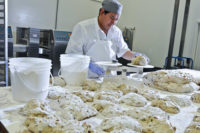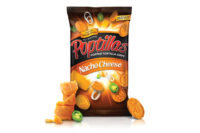
By Dan Malovany
Cynics view the glass half empty. Optimists see it as half full. When the veteran management team at Charter Baking looks at the glass, they wonder if it contains organic milk. If it does, then they perceive it loaded with opportunity.
That’s because a decade ago, organic milk emerged as a gateway category into the world of organic foods. Today, Charter Baking is betting that organic bread and other baked goods are poised to be in the same position as organic milk was in the late 1990s.
No longer is organic simply a niche for the baking industry.
“I think organic is a segment, and the segment is growing and it’s getting bigger,” says John Foley, president and CEO of Charter Baking Co., which is headquartered in Boulder, Colo., otherwise known as one of the self-proclaimed epicenters for organic foods.
The cynics may argue that they’ve heard this all before, and that nothing is ever new, especially if it’s yet-another report from a company touting the sudden emergence of organic baked goods. Believe it or not, these cynics wouldn’t get an argument from Foley and his colleagues.
Three years ago, Charter Baking began acquiring entrepreneurial baking companies that have been around since the mid- to late 1970s. Its Rudi’s Organic brand, for instance, was founded in 1976. The Vermont Bread line made its debut in 1978, and The Baker emerged in 1979. Over the past three decades, Foley says, these brands have built their credibility as recognized, natural, preservative-free names in consumers’ households in their core markets.
“It’s the authenticity of the brand that resonates with consumers,” Foley says. “It’s not someone trying to leverage a trend or take advantage of a segment. These are companies and people who have been in the category a long time.”
Charter Baking is a relatively new portfolio company of the Charterhouse Group, a New York private equity firm that specializes in investing in established entrepreneurial and middle-market companies in dynamic industry segments where it can develop the businesses to reach between $75 and $300 million in value.
Founded in 1973, the Charterhouse Group founded Charter Baking as a build-up proposition within the natural and organic baked goods segment. Today, with around $70 million in sales, the goal is to create an organization with $150 million in annual sales within the next three to five years.
“The strategy we had
three years ago is still in place today,” Foley says. “With these acquisitions,
we wanted to build the premier organic and natural company in the baking industry.
Our overall strategy was to have DSD [direct-store delivery] operations where
the demand for organic products was sustainable and could support our DSD
operation, and to have a freeze-thaw opportunity in other areas where there was
not enough critical mass to support a DSD operation.”
Two-pronged Approach
To accomplish this strategy, Charter Baking initially targeted three of the top organic food markets, namely the major metropolitan areas throughout corridors from Boston through New York to Philadelphia, with a series of acquisitions of small baked goods companies with DSD or third-party distribution systems.
In 2005, Charter Baking acquired Vermont Bread Co. in Brattleboro, Vt., and Adams Baking Co. and The Baker brand in Milford, N.J. A year later, it bought Superior Bakery Inc. of North Grosvenordale, Conn.; and the Matthew’s Bread Co., which produces whole wheat and other breads and muffins sold under the Matthew’s All Natural name that were distributed by Superior Bakery. These operations now have more than 100 combined routes serving the core organic markets on the East Coast and distributing one another’s products.
Perhaps more significantly during that period, Charter Baking purchased Boulder-based Rudi’s Organic Bakery, which has 18 routes in its core Denver market and today serves natural food stores in all 50 states with a line of freeze-thaw products.
“Rudi’s was the most advanced in strategy,” Foley says. “They wanted to become No. 1 in the natural channel and leverage that No. 1 status in the natural channel and then move into conventional distribution. We are now No. 1 in the natural channel, and we are now expanding to where consumers are by moving into all channels.”
Freeze-thaw products, distributed by common carriers, allow Charter Baking to target major organic food markets such as Austin, Texas, where DSD systems aren’t viable because the bulk of consumers throughout the state tend to purchase white or conventional bread.
Demographically, the sweet spot for the Rudi’s Organic brand is the health-conscious, high-income, higher educated mom who buys organic products for herself and her family because she wants to avoid pesticides, chemicals or growth hormones in her food. Rudi’s Organic baked goods are U.S. Department of Agriculture-certified organic, a point of differentiation for the brand, says Tom Nash, vice president of sales.
Another point of difference is the brand’s product portfolio, adds Doug Radi, vice president of marketing.
“Our strategy is to be the organic, mainstream, all-family company,” he says. “There are a lot of organic [food] companies that are doing unique breads such as artisan or local breads. We’re trying to [target] health-seeking, health-and-wellness mom and give her the products her whole family can eat.”
For instance, Rudi’s Organic top-selling sandwich varieties include 100% Whole Wheat, Honey Sweet Wheat, Country Morning White and Multigrain Oat that Radi describes as “center of the category, all-purpose sandwich breads.” The line also offers organic buns, rolls, tortillas, English muffins and more for everyday eating occasions throughout the day.
“The thing that can get you into trouble with organic is being a niche of a niche of a niche,” Radi explains. “It takes as much time to launch one product as another so you have to guard against, from a business principal, doing organic sense of scale. Targeting a mainstream audience and mainstream tastes, textures and varieties is typically a better strategy than being unique. At the same time, as an entrepreneurial company, we have the right to be innovative. You have to find the right balance.”
Mainstream Innovation
This balance between mainstream and innovation is reflected in the new products that Charter Baking has rolled out over the past year. In March, the company introduced Rudi’s Organic Wraps, which come in 7 Grain with Flax and Multi-Grain varieties. Each serving comes with 12 g. of whole grains and a combination of vitamins, minerals, antioxidants and fiber. The multigrain wrap, for example, contains organic whole wheat, spelt and millet flour.
Moreover, Rudi’s Organic Bakery rolled out four varieties of organic granola and, in May, certified-organic bagels. The six packs of pre-sliced bagels come in Plain, Honey Sweet Wheat, Multi-Grain and Cinnamon Raisin. Each bagel comes in a 2-oz. size to provide a balance of nutrition and calorie consumption, Radi says.
From a sales perspective, Nash is especially excited about the new organic bagels because they’re sold from the bread aisle and not the freezer case.
“The new offerings and new varieties allow us to target customers who didn’t know us before,” he says. “Wraps will be a good item. On the conventional grocer side of the business, this will give us new opportunities to grow.”
Charter Baking also has taken The Baker brand and repositioned the regional line as an upstart national brand by adding eight certified-organic varieties such as 7 Grain & Fiber, 100% Whole Wheat and Spelt Ancient Grain breads along with seeded rolls and mini baguettes. Supplementing these more traditionally flavored products are three more unique, “lifestyle” breads that come in Green Tea & Goji Berry, Pomegranate & Blueberry and Yoga Bread, which is a combination of organic pumpkin seeds, cranberries, poppy seeds and sunflower seeds.
Radi says The Baker line can afford to offer more innovative products because the hearty, dense loaves target a different type of consumer.
“Where Rudi’s is more for mom and her family, The Baker is more for mom herself,” he explains. “It’s more of a lifestyle type of bread, which have more unique ingredients with artisan baking. They’re Old World, artisan traditions with a twist. They’re an adult-focused bread, not for kids who eat Rudi’s Country Morning White.”
The bulk of Charter Baking’s investment, however, has been in the Rudi’s Organic brand.
“It’s our biggest, it’s our fastest growing and it’s the most on-trend and differentiated brand we have,” Radi says.
Synergies for Growth
Integrating its four businesses has provided synergies to grow the brands. Along the East Coast, Charter Baking now carries all four of its brands on its DSD systems, resulting in higher volume and shorter routes with fewer stops that allow for greater efficiencies and for sales representatives to spend more time with customers, Nash says.
To reduce shipping costs, Charter Baking invested in its North Grosvenordale bakery, which has upgraded production and been certified by Quality Assurance International to produce Rudi’s Organic bread for distribution out East. Similar synergies come from its Vermont Bread bakery, which produces organic English muffins for its Vermont Bread, Rudi’s Organic and Matthew’s All Natural labels.
Certainly, Charter Baking faces some headwinds as it pursues new opportunities. In Southern California and along the West Coast, especially in metropolitan areas such as San Francisco that are strong markets for organic foods, the company doesn’t have a DSD system, which limits distribution to many conventional retailers. During its acquisition phase, Foley says, the right opportunities weren’t available. However, it has been able to find brokers and other third parties to handle the distribution of Rudi’s Organic products.
“We will continue to turn over every stone to find some other DSD opportunities, whether they be acquisitions or organic growth or building our own route systems,” Foley says.
Executing in today’s environment, he adds, also has become more difficult.
“Obviously, the commodity impacts this year have thrown a curve ball to everyone,” he notes. “We have had to take a lot of commodity increases and taken some significant pricing actions in our portfolio to cover those commodity costs. The pricing lag versus commodities hitting has been difficult, but we performed up to our expectations in what we have laid out this year.”
Typically, he adds, organic breads are 50 to 60 cents higher than similar varieties of premium conventional products. Some natural product retailers recently reported that organic food sales have softened, but Foley remains optimistic because the fundamentals are sound. The Horizon Organic milk model isn’t broken.
“Every single person has been impacted by the change in the economy,” he says. “Once it gets back to a growth phase, the basic reasons for shifting to organic are still there. We have cleaner ingredient labels - ingredients that you can pronounce. No high-fructose corn syrup like our competitors. The green movement also helps us with the sustainability of organic farming. I think shifting will be there in the long term.”
During the past three years, Charter Baking has seen top-line sales grow 30% annually with its Rudi’s business rising more than 40% annually for the last few years. The now projected 20% annual increases will help the company attain its goal of $150 million over the next few years. Once it reaches that scale, Charter Baking may be writing its next chapter.
“We’re part of a private equity group so eventually, we’ll be up for sale within the next three to five years,” Foley says. “We’ll probably be part of a mainstream baker by then.”
Cynics may have a field day with that. Then again, they thought the world was ending during the low-carb craze until the whole grain movement emerged. That trend has been fueling sales of baked goods ever since.
In the end, it all depends if the glass is half empty or half full. Or does it provide a world of opportunity if the execution is just right?
Charter Baking is counting on that.


